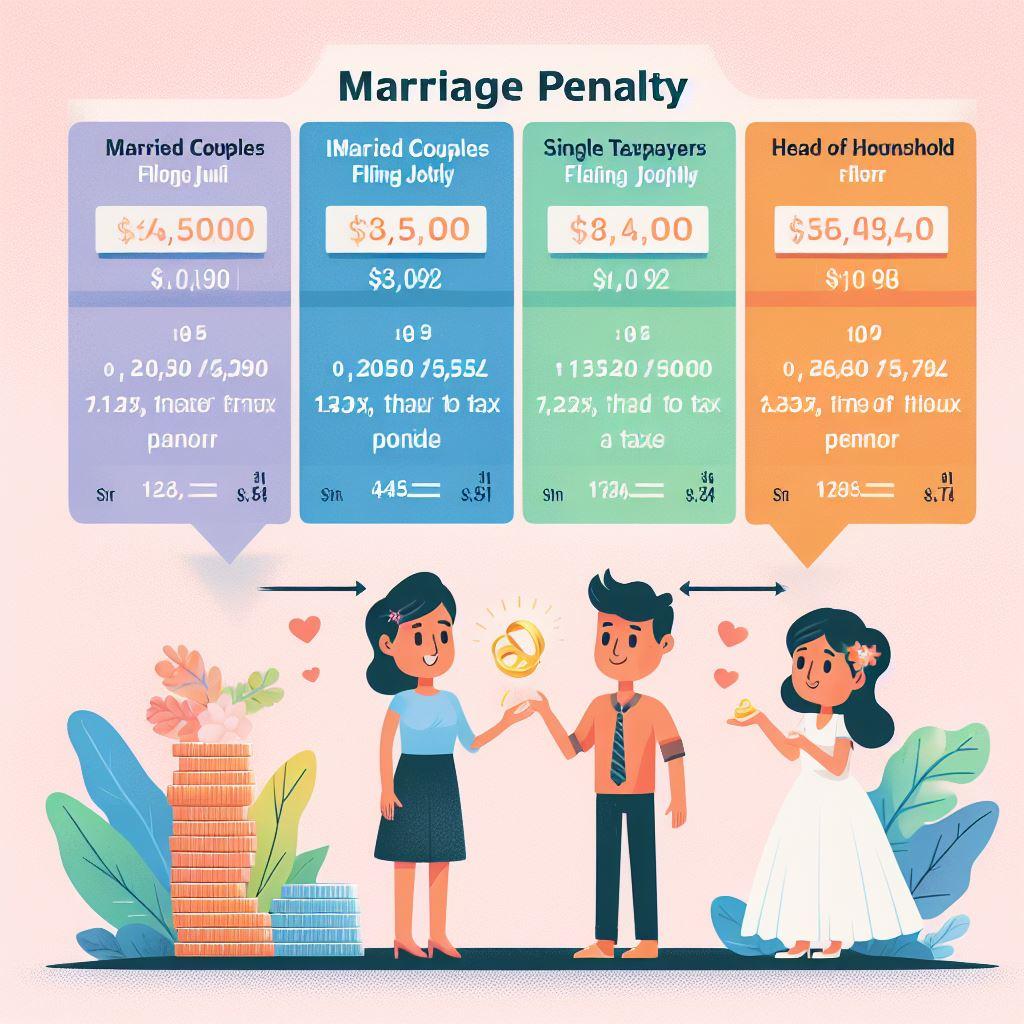
Getting married is a joyous and life-changing event, but it can also impact your finances in various ways, including your taxes. In this article, we'll explore the concept of the "marriage penalty" and how your marital status can affect your tax situation. We'll break down the basics in plain and simple language so you can make informed financial decisions as a couple.
The Marriage Penalty: What Is It?
The "marriage penalty" is a term used to describe a situation where a married couple pays more in taxes than they would if they were single and filing separately. This occurs due to the way tax laws are structured. In some cases, the combined income of a married couple can push them into a higher tax bracket, resulting in a higher tax liability.
Filing Status Options
When you get married, you have two main options for your federal tax filing status:
Married Filing Jointly: This is the most common and often the most advantageous filing status for married couples. Both spouses combine their income and deductions on one tax return.
Married Filing Separately: With this filing status, each spouse submits their own tax return. While it offers some independence, it can result in certain tax disadvantages.
Pros of Marriage: Tax Benefits
Despite the potential marriage penalty, marriage can also provide several tax benefits. Here are some ways in which being married can positively impact your taxes:
Lower Tax Rates: Married couples often benefit from lower tax rates compared to single individuals.
Standard Deduction: The standard deduction for married couples filing jointly is usually higher than for single individuals.
Tax Credits: Some tax credits, such as the Earned Income Tax Credit (EITC) and the Child Tax Credit, can be more substantial for married couples with children.
IRA Spousal Contributions: If one spouse doesn't work or has low income, the working spouse can contribute to an Individual Retirement Account (IRA) on their behalf.
Estate Tax Benefits: The unlimited marital deduction allows unlimited tax-free transfers between spouses, helping with estate planning.
Cons of Marriage: The Marriage Penalty
The marriage penalty can affect your taxes in various ways, depending on your income, deductions, and other factors. Here are some common scenarios where the marriage penalty may come into play:
Higher Combined Income: If both spouses have substantial incomes, they may end up in a higher tax bracket when filing jointly.
Deduction Limits: Some deductions and tax credits have income limits that apply to married couples, potentially reducing their benefits.
Loss of Independence: Filing jointly means sharing financial responsibilities and liabilities, which may not always be in your best interest.
Strategies to Minimize the Marriage Penalty
If you're concerned about the marriage penalty, there are strategies you can consider to minimize its impact:
Tax Planning: Consult with a tax professional to strategize your deductions and credits effectively.
Utilize Tax-Advantaged Accounts: Contribute to tax-advantaged accounts, such as retirement accounts, to reduce your taxable income.
Consider the "Married Filing Separately" Option: In some cases, this filing status might be more advantageous, especially if one spouse has substantial deductions or income.
Charitable Giving: Donating to charity can increase your itemized deductions.
Education Expenses: Take advantage of educational tax credits or deductions if you or your children are pursuing higher education.
Evaluate State Taxes: Keep in mind that the marriage penalty can also affect your state income taxes, so consider the tax implications for your specific state.
Divorce and Taxes
While no one enters a marriage thinking about divorce, it's essential to be aware of the potential tax consequences should your marriage end. Divorce can have significant financial implications, including:
Alimony: Payments made to an ex-spouse can be tax-deductible for the payer and taxable income for the recipient.
Property Settlements: Transferring property as part of a divorce settlement can have tax implications, so it's essential to understand the tax rules.
Child Support: Child support payments are not tax-deductible for the payer or taxable income for the recipient.
Dependent Claims: Make sure you and your ex-spouse agree on who can claim the children as dependents for tax purposes.
Conclusion
Marriage and taxes are intertwined, and while there can be tax advantages to being married, there is also the potential for a marriage penalty. Understanding the impact of your marital status on your taxes is essential for making informed financial decisions as a couple.
To navigate the complex world of taxes as a married couple, consider consulting with a qualified tax professional or financial advisor. They can help you assess your specific situation and develop a tax strategy that maximizes your tax benefits while minimizing potential penalties.
In the end, marriage is a personal and emotional commitment. It's essential to discuss your financial goals and concerns openly with your spouse and make financial decisions that align with your values and aspirations.
_______________________
